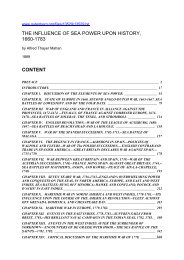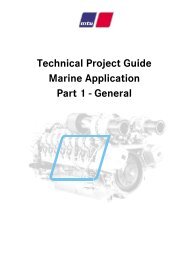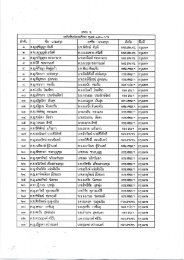The Greek Effort to Implement Vessel Traffic Services
The Greek Effort to Implement Vessel Traffic Services
The Greek Effort to Implement Vessel Traffic Services
You also want an ePaper? Increase the reach of your titles
YUMPU automatically turns print PDFs into web optimized ePapers that Google loves.
INTERNATIONAL HYDROGRAPHIC REVIEW May 2009<br />
navigation and taking advantage of the radical<br />
technological improvements the IMO has actively<br />
promoted the adoption of new technologies in<br />
order <strong>to</strong> avoid marine accidents as well as the<br />
overall support of the tasks shipmasters and<br />
naviga<strong>to</strong>rs have <strong>to</strong> successfully accomplish.<br />
<strong>The</strong> rapid technological developments –in<br />
combination with the acute economic<br />
competition- has created a new reality on the eve<br />
of the 21 st century, according <strong>to</strong> which the<br />
management of information plays a dominant<br />
role, so that sea transport can be implemented<br />
with safety. As the conditions that the modern<br />
mariner has <strong>to</strong> tackle become more multifaceted<br />
and demanding, the provision of any aid is<br />
welcome in order <strong>to</strong> minimize the risk of marine<br />
accidents. VTS overall objectives are <strong>to</strong> enhance<br />
navigational safety and security and promote<br />
marine environment protection. Recognizing the<br />
need <strong>to</strong> make the work load of the bridge officer<br />
easier, resorting <strong>to</strong> technological systems of<br />
increased capabilities seems as the right solution.<br />
Marine accidents have always happened and will<br />
continue <strong>to</strong> do so. <strong>The</strong> crews and all the<br />
competent bodies that regulate the international,<br />
regional or local navigation have <strong>to</strong> exert every<br />
effort in order <strong>to</strong> improve and guarantee better<br />
conditions of travel and more effective vessel<br />
operation having as an ulterior aim <strong>to</strong> safeguard<br />
human life, both those of passengers and those of<br />
seamen.<br />
<strong>The</strong> <strong>Greek</strong> system for the management of sea<br />
traffic undoubtedly presents a series of<br />
advantages for the country, but so far covers only<br />
the wider Piraeus area and the vicinity of Rafina<br />
as well as a small part of the Ionian Sea (the<br />
Igoumenitsa-Corfu Straits, the region of the Bay<br />
of Patras and Rio-Antirio). <strong>The</strong> immediate<br />
completion -without any further delay- of all<br />
relevant installations that were included in the<br />
initial design is deemed necessary. At the same<br />
time, a future expansion is also considered of<br />
critical importance, especially in the cases of the<br />
busy port of <strong>The</strong>ssaloniki, where there are<br />
frequent problems in the traffic of the nearby sea<br />
area, but also in the port of Alexandroupoli,<br />
where the development of the new oil pipeline<br />
creates the need for the docking of oil tankers in<br />
the near future. VTS can contribute significantly<br />
<strong>to</strong> the avoidance of marine accidents, by reducing<br />
the work load of bridge officers and by providing<br />
a completely integrated picture of vessel traffic.<br />
Any assistance that can be provided by land<br />
installations <strong>to</strong> sea traffic –even though it may be<br />
judged by some that it reduces the freedom of<br />
navigation- should be welcomed by all crews, as<br />
it can lead <strong>to</strong> the long-wished-for avoidance of all<br />
unpleasant situations of any kind.<br />
References<br />
Psaraftis Ch. N., (2002), “Maritime Safety: To Be<br />
or Not <strong>to</strong> Be Proactive,” WMU Journal of<br />
Maritime Affairs, Vol. 1-Oc<strong>to</strong>ber, pp. 3-16.<br />
Psaraftis Ch., (2003) “Marine Security: On the<br />
recovery of the lost PRESTIGE”, Nautical<br />
Chronicles, February.<br />
Dalaklis D. and Siousiouras P., (2006),<br />
“Geopolitical Aspirations and Security Strategies<br />
in the Mediterranean: <strong>The</strong> Special Role of the<br />
European Union”, Nafsivios Hora, Hellenic<br />
Naval Academy, p. 261-262.<br />
Siousiouras P. and Dalaklis D., (2007) Safety of<br />
Navigation and Protection of the Marine<br />
Environment: Land Supportive <strong>Services</strong>, p. 1,<br />
presented in the Conference “Environment and<br />
Sea Transport: in pursuit of a Sustainable<br />
Approach – Planning and <strong>Implement</strong>ing<br />
Interventions on Sea Transport and the Protection<br />
of the Marine Environment in the European<br />
Union, and South-East Europe”, Chios Island,<br />
April 19-22, 2007.<br />
Tetley L. and Calcutt D., (2001) Electronic<br />
Navigation Systems, Oxford, Butterworth-<br />
Heinemann, p. ix.<br />
Pallikaris Α. Η., Katsoulis G. and Dalaklis<br />
D.,(2008) Electronic Navigation Equipment,<br />
Athens, Eugenidio Foundation, p. 297.<br />
GMDSS Handbook – (Handbook on the Global<br />
Maritime Distress and Safety System), 3rd<br />
Edition, (2001), London, International Maritime<br />
Organization.<br />
<strong>Greek</strong> Law 712/1970, On administrative control<br />
for marine accidents.<br />
<strong>Greek</strong> Law 1650/1986, On environmental injury.<br />
Webpage<br />
http://www.imo.org/Safety/mainframe.asp?<strong>to</strong>pic_<br />
id=387<br />
Webpage<br />
http://www.imo.org/humanelement/mainframe.as<br />
p?<strong>to</strong>pic_id=287<br />
42_________________________________________________________________________














